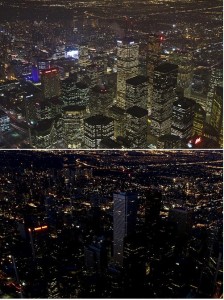Earth Hour 2011
Over 4,000 cities (including New Delhi and Mumbai) from 131 countries will turn off their lights during the global Earth Hour event Saturday, the World Wide Fund for Nature (WWF) said on Friday.
Earth Hour is organised annually on the last Saturday of March by the WWF.
“Earth Hour is your chance to vote for Earth by shutting down your lights between 8.30 p.m. and 9.30 p.m. your local time” – the WWF website read.
The origin of the campaign can be traced back to Australia in 2007 when businesses and residents in Sydney turned off their lights for one hour to make a statement about energy use and global warming.
Moscow, Geneva, Budapest, Berlin, Rome, Barcelona, Helsinki, Oslo, Madrid, Paris, London, Amsterdam and Vienna are some European cities that will turn off in the name of sustainability all non-essential lights.
In Asia, cities like Bangkok, Singapore, Mumbai, Ho Chi Minh City, Hong Kong, Seoul, New Delhi, Auckland and Shanghai will support the WWF initiative.
In North America, Toronto, Vancouver, New York and Chicago are among those that will go dark. In the South, cities including Rio de Janeiro, Buenos Aires, Santiago, Sao Paulo, Valparaiso will take part.
Even the Davis research station in Antarctica will turn off its lights.
When Earth Hour began in 2007 as an initiative of WWF Australia and the Herald, an impressive 2,2 million Sydney residents turned off non-essential lighting. The following year, more than 200 cities joined in.
Why has Earth Hour proved so popular? Obviously, the threat of climate change worries a great many people and Earth Hour gives them an opportunity to mark that concern. But some credit also goes to the architecture of this symbolic event.
Consider the 2004 Boxing Day tsunami that killed more than 300.000 people. Against expectations, perhaps, that terrible event prompted huge community engagement. How can it be that people are withdrawing from global consequence and retreating to their own insular worlds while, at the same time, responding with such unanimity and generosity to a calamity beyond their borders and experience?
Because participation in the humanitarian response effort didn’t require that you ‘join’. Membership of the Salvation Army, the Red Cross, a church group, a political party didn’t preclude your participation, but it wasn’t essential. And you could do something for as little as a dollar a time. It was easy to be involved and you got from that involvement a sense that you’d done something about a disaster that so worried you.
Earth Hour is a bit the same. All you need do is turn off your lights for an hour. You don’t have to sign up, but your participation is your statement that you want to make a difference, no matter how small the initial contribution or sacrifice.
Do you plan on sitting in the dark this Saturday night?
Around the world, people will make the symbolic gesture of showing they support a cleaner world and lower-carbon lifestyle by raising their carbon output.
Earth Hour (started in 2007) encourages people to show their support for the planet by turning their lights off and enjoying the world by candlelight. The problem, of course, is for most Canadians that means turning off a low-carbon energy source and burning pure fossil fuels.
The absurdity is likely lost on most professional environmentalists.
Most candles sold in this country are made from paraffin, a byproduct of refining crude oil. Most electricity in Canada comes from either nuclear power or hydroelectricity, both sources that don’t really emit much in the way of those evil greenhouse gases.
Now, I actually want to live in a country with clean air, clean water and clean soil to grow food in, but I fail to see how sitting in the dark for an hour once a year actually accomplishes this.
The real push for Earth Hour (of course) is to get people to stop using evil fossil fuels. The fact that little of our electricity comes from fossil fuels in Canada doesn’t bother the backers of this daft movement. So I’m guessing the fact that stopping the use of fossil fuels would kill our economy doesn’t bother the activists either.
Earth Hour is only one small step beyond Slacktivism, the kind of protest you express by changing your Facebook status to show you support cancer research but doesn’t require a donation, or putting a Free Tibet bumper sticker on your car without sending the Tibetans bullets.
